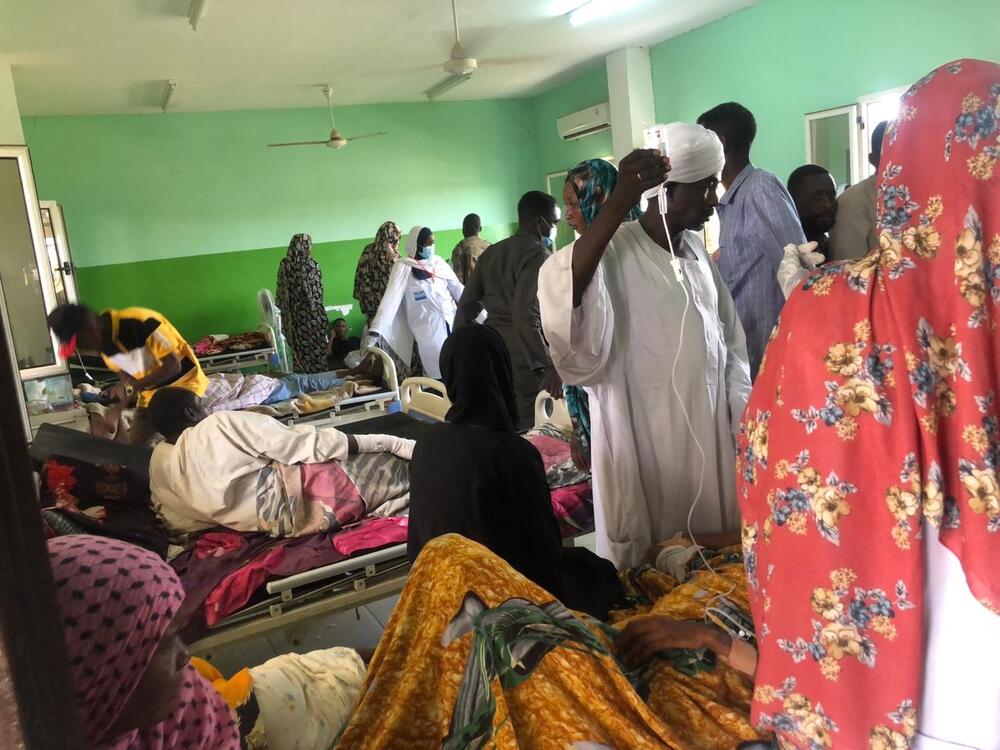Sudan: MSF teams responding to immense medical needs
In Sudan, ongoing violence is continuing in many parts of the country. Médecins Sans Frontières / Doctors Without Borders (MSF) teams on the ground report that hospitals are overwhelmed and thousands are fleeing to safer areas.
Already we are seeing immense humanitarian and medical needs.
“During a lull in the fighting, MSF was able to make a donation of medical supplies to a health facility in Khartoum on Sunday 23 April,” says Dr Ghazali Babiker, Head of MSF in Sudan.
“We are in contact with hospitals and Sudanese medical authorities and associations trying to supply additional hospitals and facilities within the capital – however, the fighting is continuing to make this almost impossible.”
Overwhelmed hospitals
In El Fasher, a large number of wounded people have arrived at the MSF-supported hospital and our teams are working around the clock to treat the injured.
At least 404 people have so far made it to the hospital for care, which is now the only health facility in the city that is still operational.
Elsewhere, thousands of people have fled from Khartoum to Wad Madani. MSF teams, including staff from Khartoum and our project in Damazin, are now assessing how we can best begin to respond to the needs there.
How can I help MSF in Sudan?
Right now, our teams in Sudan are treating patients injured or affected by the conflict. This is only possible because of donations from people like you.
By giving to our general funds today, you will be helping ensure we can respond to emergencies around the world, including in Sudan.
Please donate today to support our emergency teams.
Click here to learn more about how we spend your money
MSF-supported facilities are also continuing to treat patients in Damazin, Blue Nile State, Omdurman, Khartoum State, Kreinik and El Geneina, West Darfur, Rokero, Central Darfur, Um Rakuba and Gedaref state in eastern Sudan.
We remain committed to providing much-needed healthcare to people in Sudan, especially during these challenging moments. But to do so, we need to be able to ensure the safety and security of our staff and patients.
Urgent support
“Experienced MSF emergency teams stand ready to enter Sudan as soon as they are able to support the scale-up of our activities,” says Kate Nolan, MSF Deputy Director of Operations.
“Other teams are currently preparing and identifying the best ways to send medical and humanitarian supplies to the country.”
After more than a week of sheltering from heavy fighting in Sudan, some of our teams have relocated to safer locations, while there are plans for others to leave the country. Some staff have also relocated with their families to safer areas.
We continue to keep in close contact with all team members, as far as is possible. The safety of our staff is a top priority, and we appreciate the support we have received to safely relocate our teams.
“We reiterate our call for all those participating in the violence to respect their obligations under international humanitarian law,” says Dr Abubakr Bashir Bakri, MSF operations manager for Sudan.
“[This means] to ensure the safety of medical personnel and health facilities, to allow safe passage of our teams, ambulances and civilians seeking healthcare, and to facilitate movement of those who are delivering humanitarian assistance.”
MSF, conflict and war
In conflicts and war zones, MSF does not take sides. We provide medical care based on needs alone and try to reach the people who need help most.
If warring parties see aid organisations as being on one side of a conflict, we are less likely to gain access to those in need and more likely to be attacked.
One of the ways in which we are able to demonstrate our independence to warring parties is to ensure that all our funding for work in conflicts comes from private individuals – we do not accept government grants.
